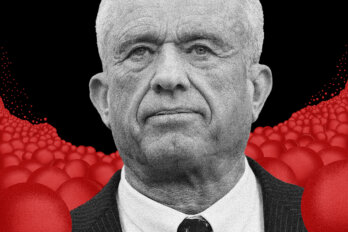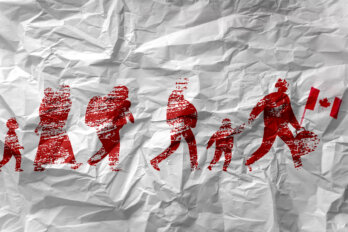On September 8, 1979, my parents and I boarded a train at Riga Central Station and left the Soviet Union. I was six. My mother was thirty-two. My father was about to turn forty-four, the age I am now. My parents had sold our possessions and paid the Soviet authorities an exorbitant fee to renounce our citizenships, rendering us stateless. Accompanying us to the station were a small number of friends and relatives—those unafraid to be seen with traitors to the motherland. When they said goodbye it was not with the routine do svidaniya (until we meet again) but the melancholy proshchay (farewell forever).
I think about what it must have been like for my parents at this moment. In the bustle of loading the belongings and exchanging last words, they must have felt the shock of finality, of realizing that what was happening could not be rescinded or revised. The possessions had been sold, the apartment vacated, the jobs abandoned. Wherever they ended up, they wouldn’t know the language, and my father, whose career had been in athletics, would almost certainly have to find other work. The life they knew was over and they had only a dim sense of what the future held. What’s more, they hadn’t necessarily needed to go. They weren’t fleeing war or genocide, but only the economic shambles of the Soviet Union and its habitual, endemic anti-Semitism. But this wasn’t new. They’d lived with it all their lives. Neither idealists nor iconoclasts, they were taking a gamble simply because an opportunity had presented itself and others had seized it.
Visas for Israel, our “ancestral homeland,” had enabled us to leave the Soviet Union, but when we arrived in Vienna, my parents declared their desire to go to some other Western country. We applied to the United Nations High Commissioner for Refugees and were registered as refugees. We stayed for two weeks in Vienna and four months on the outskirts of Rome while our case was processed. In Australia, my father had a distant aunt whom he’d never met, but to whom my parents had shipped a collection of the Russian classics, which they’d acquired with great difficulty and at considerable expense. My father’s younger sister had emigrated a few years earlier and landed in Los Angeles, but we received a letter from her husband dissuading us from even thinking about joining them. Take a cold shower, he wrote. Friends from Riga applied to Atlanta, and my parents prepared to follow suit. But, in the end, we wound up in Toronto, where we didn’t know anyone. I still consider it strange how random this all was and sometimes wonder about the lives we would have had, the different person I would have become, in Melbourne or Los Angeles, Atlanta or Israel—or Riga, had we stayed there, as others did.
For many of the people who emigrated with us, it wasn’t their first experience of exile. Most Soviet Jews of my parents’ or grandparents’ generation survived the Second World War because they managed to flee Hitler’s army. Those who remained behind met almost certain death. In the summer of 1941, when my father was almost six years old, about the same age I was when we left Riga, he, along with his parents and two sisters, boarded one of the last trains out of Daugavpils. At one point along the journey, they were attacked by a German plane and a piece of shrapnel sliced his father’s boot but, miraculously, not his foot. For four years, his family lived deep inside Russia, a time characterized by constant hunger. It stayed with him for the rest of his life. If food was ever left out, he ate it. I sometimes came into the kitchen to find him eating butter.
Not until writing this essay did it occur to me to wonder if my father knew Russian when his family fled there. He had been born in independent Latvia to a Jewish family and arguably wouldn’t have needed to speak anything but Yiddish and Latvian. Of course, even if he didn’t know Russian, he probably picked it up fast. From experience, I know how much easier it is for a child to learn a language than an adult. My maternal grandfather, also a Latvian Jew, spoke Russian imperfectly when he fled the Nazis. Near Pskov, he wanted to volunteer for the Red Army and asked a local Russian boy to direct him to the recruiting station. Because of his poor Russian, the boy took him instead to the office of the NKVD and reported him as a German spy. Only a fortunate coincidence kept him from being shot.
In fiction and in essays, I’ve written about different aspects of our emigration and my family’s history, but I feel I have only a partial understanding of it and always will. Every now and then, I learn something new. Recently, my mother and I recalled the accident I had shortly after we settled in Toronto. I fell from the jungle gym at the school playground and broke my elbow. I was with my cousin, a year younger than me. I’d always understood we were by ourselves because our parents were attending English classes. My mother corrected me. She and my father weren’t at the classes but at a hospital to see a gynecologist for a problem she’d been having, and she thought that her sister and brother-in-law were watching us. The damage to my elbow was extensive and required surgery. I didn’t speak English and couldn’t understand what the doctors and nurses were saying. My father was obliged to attend the English classes or else we would lose the government support that covered our rent and food. So my mother sat by my bedside for days, comforting me, worrying about me, understanding little more than I did of what the doctors and nurses were saying, and, secretly, bleeding. She thought she would go crazy.
Soon after, she suffered a nervous breakdown. For days, she couldn’t get out of bed. I remember paramedics coming to our apartment, putting her on a gurney, and taking her away. At this time, my grandmother came to visit us from Israel. My mother’s parents and her younger brother left Riga when we did but elected to go to Israel, largely because my grandfather—the one who was almost shot by the NKVD—was a lifelong Zionist. I don’t remember my grandmother’s visit, and I didn’t know that she’d earned the money for the plane ticket by cleaning hotel rooms. She’d planned the trip because she missed her daughters and grandchildren, not because she knew my mother was falling apart. But she came to our apartment and was shocked to see what had become of my mother. She cooked and cleaned and put us back on our feet.
I don’t relate these things to ennoble my parents and relatives. They weren’t heroes in the Soviet Union, and the experience of immigration didn’t turn them into ones. Once they established themselves, they didn’t particularly sympathize with other refugees. Rather, their attitude toward them was skeptical—if not cynical. Their politics are conservative; in America, most of them would have voted for Trump. When I challenge them on this, they dismiss me as naive. They see no incongruity. Those other refugees—particularly brown and Muslim ones—are not like them.
Actually, in the only way that matters, those other refugees are like them. They are not paragons of virtue but flawed and unexceptional people who adhere to the basic tenets of the social contract. Because, fundamentally, what do modern democracies ask of their citizens? To obey the laws and pay their taxes. If they have done nothing else, my family has done that.
Well, modern democracies ask a little more but often accept the rudiments of abiding by the laws and paying taxes. At a Canadian citizenship ceremony for my American wife, the officiant encouraged the new Canadians to embrace the civic values of their adoptive land and discard old enmities and hatreds. He emphasized the importance of exercising their franchise and of volunteering their time. An earnest and awkward representative of the local Rotary Club talked up the merits of his organization and provided free juice and cookies. There were 100 new Canadians at the ceremony. I watched them go up and accept their certificates. Among these were families with small children, dressed up for the occasion, as my parents and I had been three decades earlier. But the origins of these new immigrants had changed. Most appeared to be from the Middle East and South Asia, many with Muslim names. Driving home, I remarked to my wife that white supremacists would not have liked the look of that room.
“Good,” she said.
“Neither good or bad,” I said.
It was just a fact, value neutral.
What is a country? Who is a citizen? Where do we belong? What do we owe one another? Why have we organized ourselves the way we have? The questions sound trite, but I found myself dwelling on them recently at an Immigration and Refugee Board of Canada hearing. At the request of a writers’ organization, I agreed to serve as an observer in solidarity with a writer I’d never met. For three hours, I sat in the hearing room with another representative of the writers’ organization, the writer, his lawyer, an interpreter, and the adjudicator who interrogated the writer’s harsh and tumultuous life, testing, not unfairly, apparent inconsistencies and lapses in his story. For instance, if a man receives a terrifying phone call in which his life is threatened, does he remain in his parents’ house for several weeks while he awaits his travel documents? If he fears the police because they are complicit with the religious fanatics who hate his books, and if these same police abuse him in a vile and despicable way, could he not evade them by moving to another city inside his own country?
They were reasonable questions. The writer countered them with the peculiar logic and idiosyncrasy of a human life—much of which could not be substantiated. But he came from a place where the things he described were plausible, and they were worse than anything my parents experienced in the Soviet Union. He’d had the bad luck to be born at the wrong time between the wrong borders. His government was as glad to be rid of him as he was to have left. He believed he was better suited to Canada. From what I could see, he was right. Even if it was discovered that he was being less than fully truthful, I thought he was harmless. But it was as likely as not that he would be sent back. The case could be made that he had arrived under false pretenses while others sat in their miserable countries or in displaced persons camps waiting to be admitted. Was it fair that he should be allowed to stay? Then again, he was already here, and the country is big and can accommodate thousands like him without anyone noticing. And yet so much effort had been invested into deciding his claim. Months of preparation. Documents filed. A room reserved. All of us assembled. The proceedings conducted with utmost gravity. Politicians defining themselves by it. Families quarrelling and becoming estranged. But the longer I sat in the room, the more arbitrary it seemed.
At the end of the three hours, the adjudicator still hadn’t rendered his verdict. His interrogation had run long. The lawyer hadn’t had a chance to question his client. It was resolved that we would return in a month. The outstanding issues remained: credibility, identity, delay, objective risk, and subjective fear.
Essay by David Bezmozgis, excerpted from The Displaced, edited by Viet Thanh Nguyen © Abrams Press, 2018.




